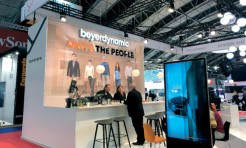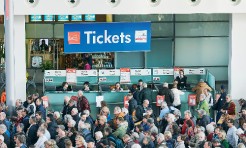UFI in St. Petersburg: “There is huge unexploited potential”
The open UFI seminar is taking place in St. Petersburg
from 30 June to 2 July. Jochen Witt, an international trade fair expert, is
extremely well acquainted with events on the ground in Russia.

Having held its annual
congress in Moscow in 2005, UFI, the global association of the exhibition
industry, is now coming to Russia again. At the time of the congress almost
nine years ago, there was a spirit of optimism in the air, but the atmosphere
now is somewhat darker. Developments in Ukraine are not exactly having a
positive effect on economic forecasts in the Russian Federation. The
International Monetary Fund expects growth of only 1.3 percent this year. Russia’s
finance minister, Anton Siluanov, recently indicated he was even more pessimistic
than that, fearing growth of under one percent. “If the political situation
around the Ukraine conflict doesn’t change quickly, the years 2014 and 2015 will
be difficult for the economy,” believes Jochen Witt, managing director of the
trade fair consulting firm JWC. “The players involved in the Russian trade fair
industry are likely to experience the negative impact from this after a short
delay,” says Witt.
The theme of the upcoming UFI seminar in St. Petersburg is “Broadening perspectives – smart ideas for the 21st century exhibition business”. The speakers and other attendees will be turning their attention to innovations that will result in successful events in the future (www.ufi.org). The Russian economy needs a similar innovative boost to enable the long-promised modernisation process to get under way. “I have seen a lot of Russia. And I love the country and its people,” says Jochen Witt, reporting on his wide range of experience in the country. “There is huge unexploited potential,” he stresses. “Over the long term the prospects for the trade fair industry as well are fundamentally positive.” However, Russia’s economic success continues to depend largely on its oil and gas exports – and that trend is actually increasing. For years now, the politicians have been talking about how to become more independent of these exports of raw materials and create more value in the country. “A lot of lip service is paid to this, and a number of well-meaning initial steps have been taken such as the “innovation city” near Moscow,” continues Witt. “Ultimately, however, implementation is often extremely difficult due to a lack of relevant expertise and suitable structures – and the fact that people are unfamiliar with the processes required.”

There is also a need to set
a process of modernisation in motion in the events industry. There needs to be
a kind of government master plan for the Russian trade fair and convention
industry –to develop new marketplaces for exhibitors, as in China, for example,
and thus inject dynamism into the economy and generate momentum. “With the
exception of a few event centres such as Expocentre and Crocus Expo in Moscow
and the trade fair centre in Jekaterinburg, there is a shortage of high-quality
venues,” asserts Witt. “The ExpoForum in St. Petersburg will soon be coming on
stream, and that’s a state-of-the-art venue.” The new trade fair and convention
centre will give the city on the Neva a boost. But it’s not as if this will
completely reshuffle the cards in the Russian events industry. “The new centre
will further consolidate St. Petersburg’s position as the number two in Russia,”
argues Witt. “Most of the leading international trade fairs will still be held
in Moscow,” predicts the events expert, who served as UFI president a number of
years ago. “That has to do with the centralised structure of Russian society,
which affects the economy and the trade fair industry as well.”
Nevertheless, the ExpoForum certainly has the potential to achieve business success in the next few years and beyond. Jochen Witt believes the prospects for conventions and combined conventions and trade fairs are good in St. Petersburg. “The decision-makers here have an opportunity to position themselves for the future in relation to Moscow, the capital,” he claims. As far as typical trade fair business is concerned, however, there are only a few niches with the potential for leading international trade fairs. “Trade fairs for the energy, forestry and chemical industries are among those that could successfully become established at the ExpoForum,” believes Witt (www.jwc.eu.com).
Russian parliament discusses developing the trade fair industry

The Federation Council of the Russian Federal Assembly convened for a hearing on 19 February, chaired by Valentina Matvienko. There was an intense debate about the legal basis of activities in relation to exhibitions, trade fairs and conventions as a mechanism for facilitating competitive growth and the sale of Russian goods and services to both domestic and international markets. The list of those in attendance read like a who’s who of Russian economic and industrial policy. High-ranking trade fair industry players also had their say. Among those who spoke at the hearing were Sergey Bednov, the director general of Russia’s leading trade fair company, Expocentre. He described how the Russian Federation has only just over two percent of the world’s exhibition space, which is very little given the size of the country’s territory. It compares unfavourably with other leading economies such as the USA, China or Germany, which have between 10 and 20 percent. The solution to the problems is outlined in a development strategy for the Russian exhibition, trade fair and convention industry. To bring the regulatory framework into line with the actual requirements of the exhibition and trade fair industry, rapid action is necessary, claimed Sergey Bednov. He went on to say it was necessary to draft suitable legislation: a law on exhibition, fair and congress activities in the Russian Federation. General provisions of the draft legislation were discussed, as were the measures that could be taken to promote regional event venues. There is a shortage of suitable exhibition space in the provinces, in particular, which is an impediment to economic growth. The hearing also touched on how the trade fair industry of this huge country can be developed so that it can play its part in the implementation of Russia’s foreign trade strategy (www.expocentr.ru).
Author: Peter Borstel
This article was published in TFI issue 3-4/2014
Share in Facebook, Twitter or Google+:
TFI - Trade Fairs International - The International Trade Fair Magazine.
© 2006 - 2024 by TFI-Verlagsgesellschaft mbH. All rights reserved. TFI-Verlagsgesellschaft mbH shall accept no responsibility for the contents of external links and other contents.
TFI-Know-how
-
What to do when things go wrong at virtual or in-person events?

In the event world, it’s simply part of life if things don’t work out as planned.
-
How can networking be made to work at online events?

Networking typically happens at real, in-person events. But it’s also possible to do it online; it just works a little differently. There are various options available to organisers.
-
How can exhibitors stand out at trade fairs?

New products and a well-conceived stand design are not the only drivers for a successful presence. Many other factors are also important, but trade fair planners often lose sight of them.
-
How can industry decision-makers be reached online?

Trade fairs and trade fair companies need to constantly further develop, become more agile and flexible and offer services all year round. New, digital offerings are very important here. With its TrustedTargeting technology, Messe München offers its customers access to leading business-to-business decision-makers on the Internet.


